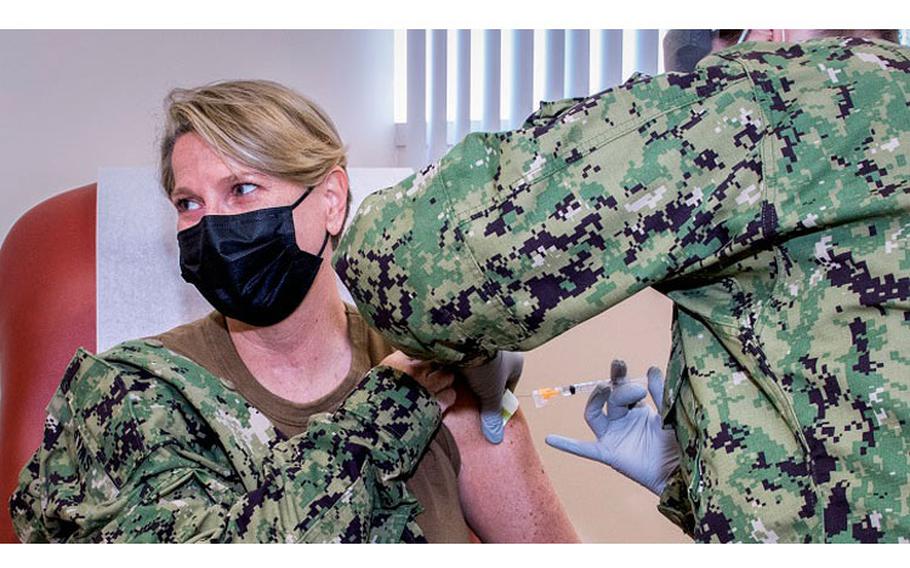Community News
Annual flu vaccine remains a health priority during COVID-19 era
Military Health System Communications Office October 14, 2020

Navy Rear Adm. Anne Swap, National Capital Region director, receives her annual influenza vaccine at the Fort Belvoir Community Hospital. She accompanied Army Lt. Gen. Ronald Place, director of the Defense Health Agency, to the facility as he, too, received his annual flu shot. ()
With the novel coronavirus still in circulation, "We don't know how this flu season will impact us," said Army Lt. Gen. Ron Place, director of the Defense Health Agency. "We do know that getting your influenza vaccine is a critical step to keep you and your family healthy."
Influenza is a contagious respiratory illness. It can be spread to others up to about 6 feet away, according to the Centers for Disease Control and Prevention. The flu is spread mainly by droplets from sick people when they cough, sneeze, or talk. These droplets can land in the mouths or noses of people nearby, or they might be inhaled into the lungs.
The flu can be associated with serious illnesses, hospitalizations, and deaths particularly among older adults, very young children, pregnant women, and people of all ages with certain chronic medical conditions.
As the CDC notes, flu vaccines cause antibodies to develop in the body about two weeks after vaccination. These antibodies provide protection against infection from the viruses that are used to make the vaccine.
An annual flu vaccination is mandatory for active-duty service members, notes Dr. Jay Montgomery, medical director of the Defense Health Agency's Immunization Healthcare Division North Atlantic Region Vaccine Safety Hub. He and other health care experts recommend that, generally, everyone six months and older should also get it.
"Adding influenza vaccination to social distancing and masking will lower your risk of contracting two potentially serious respiratory diseases close together – which could very much worsen your outcome," Montgomery said.
"Getting the vaccine also means you're also less likely to potentially expose yourself to COVID-19 by sitting in an urgent care facility or emergency room waiting to have your flu symptoms treated," he added.
Children should be immunized even if schools don’t fully reopen, Montgomery said. "School isn't the only place where children can come in contact with viruses and bacteria that cause them to get sick," he said. "Playgrounds and grocery stores are also examples of exposure locations."
In the Department of Defense, the services annually review and vote on the list for vaccine flu distribution. Priority goes to overseas locations, ships afloat, and deployed personnel. When those locations are fulfilled, distribution is prioritized by each individual service for delivery to their locations in the continental United States, in support of all active and reserve locations.
When the vaccine arrives at a military medical treatment facility, the commander of the installation has the authority to determine priority for receiving it. Learn more about DoD flu vaccine availability on the Military Health System website.
If you want to get a flu shot before it’s available at your MTF, the vaccine is covered by TRICARE with no cost-shares or copayments as long as it's administered by a pharmacist at a participating network pharmacy or by a TRICARE-authorized provider. Learn more about the TRICARE benefit and the flu vaccine at the TRICARE website.